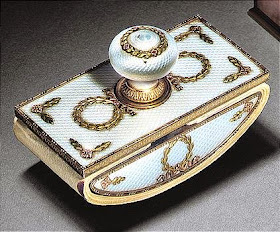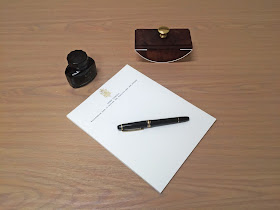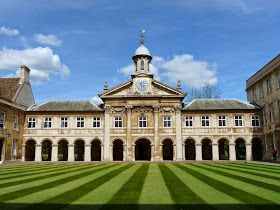Having mild OCD has its benefits. One such benefit is that I'm sure that the formal lawns around WBP will have perfectly mown stripes, in boustrophedon fashion. I love striped lawns. It demonstrates hard work and pride! And they look good. At WBP the stripes will provide a more dramatic contrast between the formal lawns around the house, and the rest of the parkland which will be left with a constantly 'grazed' look.
We did our due diligence before choosing our grass seed from the many that are available on the market. Ours is a lush midgreen grass blend known as Tournament. It has a blend of fine fescues and rye grasses, which is designed to look good most seasons of the year, tolerate dry and wet equally as well, and above all, take well to being finely manicured.
Fescue is a hardy tough herbaceous plant used in varying proportions with rye grasses in most lawn seed mixes to provide height and hardiness.
I suspect one of the big problems we will face down the track is trying to maintain the fine grasses without self-sown grass seeds, such as paspalum, borne on the wind from our farm and those of neighbouring estates, causing clumps of weeds in the lawn. Paspalum grows in thick clumps as is a common cause of unsightly lawns in NZ...
The options for controlling it include digging patches out or spot spraying - both of which leave unsightly marks on the lawn.
All lawns require effort if they are to look good. It is a misconception that all they require is water in summer and clipping when they look too long.
Grass, like a hedge, will do much better if it is cut frequently but lightly (usually weekly, even if it is still looking good). They do not take well to being left for a couple of weeks and then heavily massacred.
Like other plants they also look much healthier if they are regularly dressed with a slow release fertiliser. I can see the logic in people saying not to fertilise them as then they grow faster and require cutting more often, but if you want your lawn to look really good you can't take short cuts.
Above:A Croquet Lawn
Below: A Terraced Lawn
Once you have prepared the ground (cultivated it, harrowed it, sprayed it for weeds, left it for a couple of weeks, harrowed and sprayed it again, sowed it, dressed it with fertiliser, watered it and have finally started to get a nice dense lawn), you are then ready to cut and roll.
The stripes in the lawn (much like unsightly track marks on modern carpets) are caused by the grass lying in opposite directions once cut. You can approximate the effect by simply cutting the grass in alternating directions as you go, but to get the dramatic look you should have a roller behind the mower to really flatten the grass, emphasising the difference in direction.
You can buy various rollers. The romantic in me initially wanted to get one of these lovely antique rollers below, the sort I remember at my grandfather's croquet club when I was little...
But, being more practical I found these two rollers, which we ended up purchasing...
There is a small hand roller, which can be attached to a push mower or used separately afterwards; and there is a large roller, which will connect to our ride-on lawnmower for the larger areas, to ensure the lovely striped finish. They came as empty barrels, which you can fill with water or sand to the desired weight. I think we will use water, as that will be easier to drain out again if required.
To finish I'd like to share one of my favourite
Tottering-By-Gently cartoons by the very talented Annie Tempest (always a favourite part of reading Country Life magazine) showing the difference between Daffy and Dickie mowing the lawns.
















































